Introduction
You and your child are a team. As your baby grows, he* will need to make great changes. So will you. Both of you need to adjust to these changes. How will you know what your baby needs?
Of course your baby cannot tell you in words what she needs. So you must look for signs. You will be like a detective—trying to find clues.
When it comes to feeding your baby, you will need to use your detective skills to know when to begin and when to stop. Signals are sent through your baby’s body: signals for hunger and signals for fullness. Your baby then sends signals to you.
You must learn what these signals are. We have translated these signals for you. Use this guide to help you learn what to look for as your baby grows and changes.
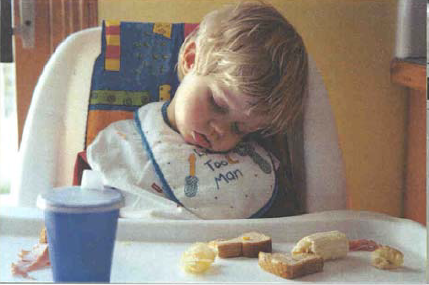
During the toddler years (ages 12-24 months)
- I am learning that you and I are separate people. I am in the “Look at ME” stage. I need to explore, and make safe and healthful choices.
- You need to teach me how to eat properly. Please use the suggestions below to help me learn without feeling shame, doubt or guilt.
Do These Things to Help Me Learn and Grow
- encourage me to feed myself even though it is messy! Give me small, easy to handle spoons and forks.
- listen to me . . . I can tell you when I am full.
- accept that I may go on food jags and only eat certain foods for a month or two, or be “finicky.” This is normal and will not last very long. Offer small serving of favorite food along with other food.
- serve food so I can eat it easily (e.g. not too hot or too cold, cut up in cubes or small pieces, etc.).
- serve me small amounts of food and give me more if I am still hungry.
- let me eat until I am full.
- help me pay attention to eating without forcing me.
- serve food in the way I like it (e.g. nothing touching; sandwiches cut into halves instead of quarters).
- select what foods to bring into the house. Give me a chance to choose between two healthy foods.
- supervise to keep me safe from harm— including not serving “hazardous” foods (see below).
- put old newspapers or shower curtains under my chair to catch my spills.
- look for signs that I am finished eating. It’s time to clean up and do something else.
- allow me choices without making negative comments about what I choose.
- serve meals and snacks on a flexible but reliable schedule.
Let Us Work Together as a Nurturing Team
To find out if I am hungry, ask:
- Is your stomach making funny noises?
- Are you tired? (Sometimes children feel tired when they are very hungry.)
- Are you ready to eat?
To find out if I am full, watch me:
- I may slow down my eating.
- I may start to play, throw or mess with my food.
- I may fall asleep.
Ways To Avoid Choking
NOTE: Young children choke very easily. Moms need to protect their most important team member.
- Children eat only when seated and calm.
- Serve small pieces of easy to chew foods.
- Be a role model—take small bites, chew well.
- Stay with your child when he is eating.
Avoid Serving These Hazardous Foods:
- Nuts
- Cherries
- Hard Candy
- Mini-marshmallows
- Whole Berries
- Hot Dog Circles
- Popcorn
- Raisins
- Grapes
- Chunks of Meat
- Globs of Peanut Butter (especially on a spoon)
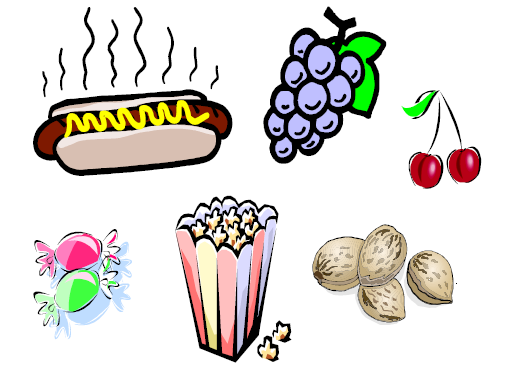
Nurturing Partners
- Work as a team.
- Your baby senses signals of hunger and fullness.
- Your baby sends you these signals.
- You respond.
- You and your baby are a happy team.
Birth-1 month (Newborn)
When I am hungry, I may:
- Begin to move my mouth (even in my sleep).
- Rapidly move my eyes in my sleep.
- Try to suck on my hand or tongue, your shoulder or anything I touch.
- Bob my head and "root" around.
- Squirm. Stretch, clench my fists or toes.
If you do not respond to these signs, I CRY. If I cry too long, you may not be able to calm me down to feed.
When I’ve had enough I may:
- Fall asleep with the nipple in my mouth.
- Appear to smile.
- Relax my hands and feet.
- Try to turn my head away.
- Push the nipple out of my mouth.
- Arch my back.
- Close my lips tightly if you try to insert the nipple.
- Bite the nipple, purse my lips.
I can only eat small amounts at a time – my stomach is only the size of a Ping-Pong ball.
I won’t be able to control my neck until I am 2 months old.
I can only suck and swallow liquids. If you try to feed me solid foods, I will push them out with my tongue.

1-3 months (Heads Up)
When I am hungry: I still send you all the signals listed above.
When I’ve had enough I may:
- Push away the breast or bottle.
- Turn away.
- Put my hands in front of my mouth.
- Cry and fuss.
- Forcefully move my entire body away from you.
- Smile.
- Fall asleep with the nipple in my mouth.
I can begin to control neck and head muscles, but my tongue and lips are still not moving properly to be ready for solid foods.
If you try to feed me with a spoon, I won’t know what to do with it.
I will push the spoon and the food out of my mouth with my tongue.
I am not yet ready to eat these foods.
I can hold my head and chest up when I am on my tummy.
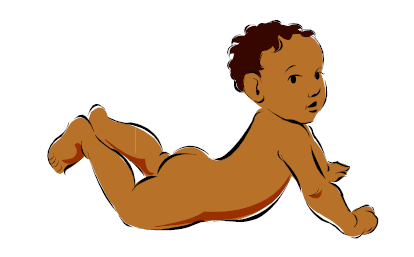
4-6 months (Almost Sitting)
When I am hungry, I may:
- Reach for the spoon.
- Move thinly prepared foods (such as baby cereal) to the back of my mouth.
- Lean forward for food.
- Recognize my spoon.
When I’ve had enough I may:
- Push the spoon away or play with it.
- Hold my mouth tightly shut.
- Turn my upper body away.
- Lose interest in feeding.
- Make cooing noises.
Big changes occur during this time.
I may weigh twice as much as I did at birth and I sleep regularly.
My tongue begins to bring food into my mouth.
I can sit with support.
I control my head and upper body and interact with you.

6-9 months (Sitting)
When I am hungry, I may:
- Grab for the food.
- Try to feed myself (although I am quite messy and can not pickup small pieces yet).
- Pound on my tray.
- Cry if you stop feeding me when I am still hungry.
When I’ve had enough I may:
- Be easily distracted.
- Simply refuse to eat.
- Cry if you try to force me.
- Shake my head as if to say "No".
I grasp objects and may want to feed myself.
I show signs of munching so I can be given semisolid foods, such as crackers, soft pieces of banana, etc.
I have teeth coming in so I can chew.

9-12 months (Crawling)
When I am hungry, I may:
- Happily recognize it’s time to eat when I see food.
- Grab for food to feed myself.
- Try to get the foods you are eating.
When I’ve had enough I may:
- Throw my food and utensils.
- Play with my food.
- Be easily distracted.
I can:
Start to drink from an uncovered cup, if someone holds it for me.
Use a covered cup by myself. Begin to handle a spoon.
Feed myself.
Sit without help.
Use my whole hand and palm to bring food to my mouth.
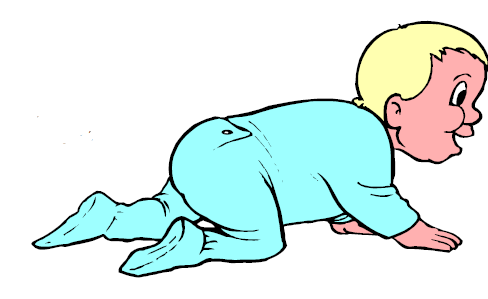
12-24 months (Toddling)
At this age, my growth slows WAY DOWN and so does my appetite.
Please do not insist that I eat more after I am full. It’s not good for me to eat too much!
I am often more interested in my surroundings than in eating.
I drink well from a cup and can begin to be successful using a blunt child-size fork and spoon.
When I am hungry, I may:
- Tell you with my words when and what I want to eat.
- Only want to eat certain foods all the time.
- Resist trying new foods (I may want to see, lick and taste the food many times before I eat it).
When I’ve had enough I may:
- Not eat as much as I did when I was younger. My appetite goes way down.
- I say "NO" often.
- Either cry and fight with you if you "force" me to eat, or I give up and eat more than I need.
The best team is one where both members play a role. As the nurturing team, you and your baby must set some basic game rules. We have prepared a list of rules that other moms have found to be very helpful.

During the first year of life
Children need to develop feelings that you are a reliable and trustworthy member of their team.
Trusting Behaviors
- Parents set a comfortable mood and tone by securely holding and responding to the baby
- Parents learn baby's signals for hunger, fullness and other discomforts.
- Parents provide appropriate food for baby's age.
- Parents help baby to focus on eating.
Mistrusting Behaviors
- Parents prop bottles.
- Parents hold off feeding by using a strict schedule.
- Parents continue to feed when baby signals them to stop.
- Parents feed baby solid foods before the baby is ready.
- Parents interrupt feeding baby to clean baby up or to play with baby.
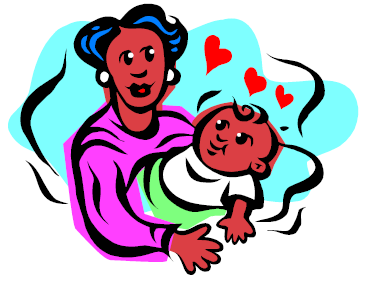
Sigman-Grant. M.
2002,
You And Your Baby: The Nurturing Team…,
Extension | University of Nevada, Reno, FS-02-14


